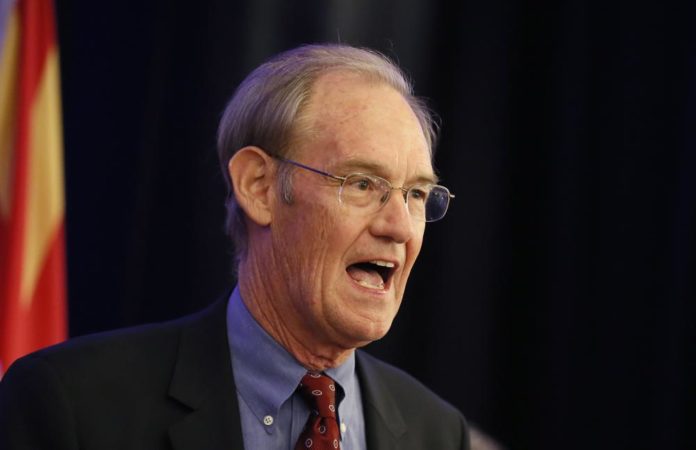
A judge ruled Thursday that an Arizona initiative expanding voting access and rolling back a host of restrictions enacted by the Republican-controlled Arizona Legislature and GOP Gov. Doug Ducey will be on the November ballot, barring a successful appeal to the state Supreme Court.
But backers of the Free and Fair Elections measure barely squeaked by after opponents succeeded in disqualifying more than 96,000 qualifying signatures. That left the initiative with just 2,281 more than the required 237,645 signatures needed to make the ballot.
The ruling from Judge Joseph Mikitish came after three weeks of furious court action as backers of the election measure and two other initiatives tried to fend off challenges that the Legislature and Ducey have made far easier to win.
The Arizona Supreme Court issued rulings in all three measures Wednesday night that kept two of them on the ballot. If approved by the voters, they will require greater transparency for political spending and boost the amount of assets shielded from creditors.
The high court’s ruling in the Free and Fair Elections case mainly rejected opponents’ arguments over qualifying signatures, but several challenges to lower court rulings on signatures split for each side.
The court sent it back to Maricopa County Superior Court judge Joseph Mikitish to consider those rulings and do the final math to determine if backers have enough signatures. He released that ruling midday Thursday and ordered Secretary of State Katie Hobbs not to rescind her determination that the measure qualifies for the ballot.
The Arizona Free Enterprise Club, the pro-business group that challenged the initiative, is appealing the new ruling again.
Stacy Pearson, a spokeswoman for the group backing the initiative, said she doubts the court will intervene.
“Yes, there is still one more procedural hurdle, but if we were in the position to have to appeal, that would just be performative rather than judicial,” Pearson said. “So we’re very confident the Supreme Court will (uphold) the fair ruling that was based on good law and good math.”
The Free and Fair Elections measure changes a slew of election laws. It specifically blocks the Legislature from overturning the results of presidential elections, an avenue some Republicans explored after former President Donald Trump’s loss in the state in 2020.
It also guarantees ballot privacy and bars handing election materials or ballots over to outside groups like the state Senate did after 2020, expands voting access, mandates that all voters can go to any polling site, extends early voting, and limits lobbyist’s ability to wine and dine lawmakers.
“The single most important component in this initiative is that it prevents the Legislature from overturning the results of an election,” Pearson said. “And, it prevents Cyber Ninjas in green shirts from spinning around ballots on Lazy Susan tables again and making a mockery of Arizona’s extraordinarily safe and secure election process.”
The measure also would eliminate the “strict compliance” legal standard that led Mikitish to disqualify many of the petition sheets. The GOP-controlled Legislature required that standard for initiatives in 2017, making it easier to throw them out for relatively minor paperwork errors. Mikitish noted in an earlier ruling that it “requires nearly perfect compliance with constitutional and statutory mandates.′
The Supreme Court’s Wednesday evening rulings were the last word on a measure called the Predatory Debt Collection Protection Act, backed by a California labor union and opposed by a new group organized by Arizona debt collection companies.
The initiative would raise the amount of a home’s value shielded from creditors under the “homestead exemption” from $150,000 to $400,000 and boost the value of vehicles, cash, and other possessions shielded from creditors. It also caps interest rates on medical debts and adds yearly inflation adjustments.
The court also allowed a measure backed by former Arizona Attorney General Terry Goddard to be on the ballot if the secretary of state certifies that it has enough valid signatures later Thursday, as appears likely. The Voters Right to Know Act will require any organization spending more than $5,000 on campaigns to identify all donors, with big penalties for failing to do so.
All three measures faced challenges to signatures based on paperwork errors made by paid circulators. But the most important challenge likely would have kept all three measures off the ballot. It argued that paid petition circulators needed to file affidavits certifying they legally can collect signatures with the secretary of state for each initiative they circulate.
Goddard and lawyers for all three measures said that election rules require them only for initial registrations, and even if they did not, the secretary of state’s online portal only allows one affidavit to be filed.
A unanimous Supreme Court ruled that the certification must be provided for each measure. But Chief Justice Robert Brutinel wrote that throwing the initiatives off the ballot would impede the constitutional right of the people to write their own laws.
“A finding of non-compliance and disqualification of circulator signatures on this record and under these circumstances would “unreasonably hinder or restrict” the exercise of the initiative power under … the Arizona Constitution,” Brutinel wrote.
Goddard, who has worked for years to get the political spending transparency measure on the ballot, applauded the ruling.
“Justice prevailed. I’m delighted,” Goddard said. “And they did what we hoped they would do, which is to say the logic says that there should have been an affidavit each time, but you can’t hold someone to a standard that it’s impossible to comply with.”
Republished with the permission of The Associated Press.














